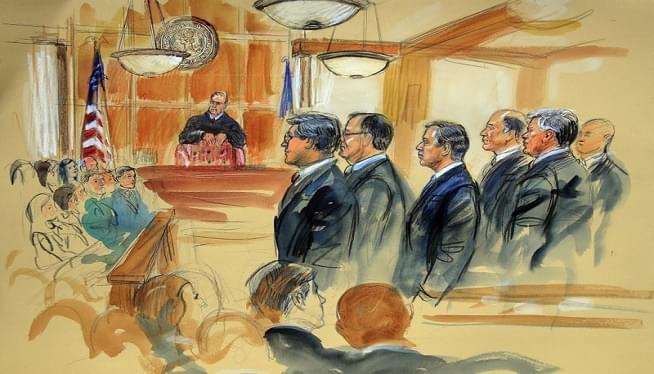ALEXANDRIA, Va. — Paul Manafort orchestrated a multimillion-dollar conspiracy to evade U.S. tax and banking laws, leaving behind a trail of lies as he lived a lavish lifestyle, prosecutors said Tuesday as they laid out their case against the former Trump campaign chairman.
During his opening statement, Assistant U.S. Attorney Uzo Asonye told the jury that Manafort considered himself above the law as he funneled tens of millions of dollars through offshore accounts. That “secret income” was used to pay for personal expenses such as a $21,000 watch, a $15,000 jacket made of ostrich and more than $6 million worth of real estate paid for in cash, Asonye said.
“A man in this courtroom believed the law did not apply to him — not tax law, not banking law,” Asonye said as he sketched out the evidence gathered by special counsel Robert Mueller’s team in Manafort’s bank fraud and tax evasion trial.
It’s the first trial arising from Mueller’s investigation into potential ties between Donald Trump’s presidential campaign and Russia. Mueller was not present in the courtroom.
Defense attorney Thomas Zehnle said in his opening statement that Manafort trusted others to keep track of the millions of dollars he was earning from his Ukrainian political work.
A jury has been seated in the trial of President Trump’s former campaign chairman, Paul Manafort, on tax evasion and bank fraud charges. Associated Press reporter Eric Tucker says Manafort seemed calm and prepared for the court proceedings. (July 31)
He made clear that undermining the credibility of Rick Gates, his former business associate and the government’s star witness, is central to the defense strategy. Zehnle said Manafort, earning millions as a political consultant helping officials in other parts of the world, relied on Gates and others — including a professional accounting firm — to keep watch over the money.
“Money’s coming in fast. It’s a lot, and Paul Manafort trusted that Rick Gates was keeping track of it,” Zehnle said. “That’s what Rick Gates was being paid to do.”
He warned jurors that Gates could not be trusted and was the type of witness who would say anything he could to save himself from a lengthy prison sentence and a crippling financial penalty.
Gates, who spent years working for Manafort in Ukraine and is also accused of helping him falsify paperwork used to obtain the bank loans, cut a plea deal with Mueller earlier this year. Gates also worked as an aide on Trump’s campaign.
Manafort, who has been jailed for nearly two months, wore a black suit and appeared fully engaged in his defense, whispering with his attorneys during jury selection and scribbling notes as the prosecution began its opening statement.
Before the start of jury selection Tuesday, prosecutors filed an expanded list of its evidence exhibits, including several email chains between Manafort and Stephen Calk, a Chicago bank chairman. The added evidence also appears to include documents related to bank accounts in Cyprus.
The government intends to show that Manafort funneled more than $60 million in proceeds from his Ukrainian political consulting through offshore accounts and hid a “significant” portion of it from the IRS.
Asonye said Manafort created “bogus” loans, falsified documents and lied to his tax preparer and bookkeeper to conceal the money, which he obtained from Ukrainian oligarchs through a series of shell company transfers and later from fraudulently obtained bank loans in the U.S.
But Zehnle disputed prosecutors’ account that Manafort was trying to conceal his earnings by storing money in bank accounts in Cyprus. He said that arrangement was not Manafort’s doing but was instead the preferred method of payment of the supporters of the pro-Russia Ukrainian political party who were paying his consulting fees.
Defense lawyers also sought to address head-on Manafort’s wealth and the images of a gaudy lifestyle that jurors are expected to see during the trial.
“Paul Manafort traveled in circles that most people will never know and he’s gotten handsomely rewarded for it,” Zehnle said. “We do not dispute that.”
The judge even interrupted the prosecutor during his opening statements to caution him against suggesting there was something criminal about being a multimillionaire.
“It isn’t a crime to have a lot of money and be profligate in your spending,” U.S. District Judge T.S. Ellis III said.
Prosecutors made no reference to Trump in their opening statement nor discussed in any way Manafort’s leadership of the Trump campaign, or the ongoing investigation into potential collusion between Russia and the president’s associates. Despite that, Manafort’s case is widely viewed as a test to the legitimacy of Mueller’s ongoing probe, which Trump has dismissed as a “witch hunt.”
“There was No Collusion (except by Crooked Hillary and the Democrats)!” Trump tweeted early Tuesday.
The trial is expected to last several weeks.
At jury selection earlier Tuesday, the pool faced questions from both sides and the judge as they tried to weed out potential prejudice in what has become a highly publicized and politically divisive investigation. A jury of six men and six women was ultimately selected, along with four alternate jurors.
Manafort has a second trial scheduled for September in the District of Columbia. It involves allegations that he acted as an unregistered foreign agent for Ukrainian interests and made false statements to the U.S. government.
The other 31 people charged by Mueller so far have either pleaded guilty or are Russians seen as unlikely to enter an American courtroom. Three Russian companies have also been charged. One of those companies has pleaded not guilty and is fighting the allegations in federal court in Washington.
Copyright 2018 The Associated Press. All Rights Reserved. This material may not be published, broadcast, rewritten, or redistributed. (Photo: AP)





















